Social economy
Pakistan should realise the inappropriateness of its existing economic model and go for a more socially inclusive one.

The writer is Executive Editor of The Express Tribune
Since Pakistan’s scorecard on all these essentials is totally blank, the state, therefore, finds itself continuously in a state of tentativeness. That is why, perhaps, non-state actors are being seen gradually becoming more potent than the state itself; the insurgency in Balochistan refusing to subside even after 66 years of the state’s existence and the militants in the north — in conjunction with the religious radicals of Punjab — increasingly threatening Pakistan’s statehood.
There are many reasons why Pakistan as a state has landed itself on such a slippery slope. The main one, however, being the economic policy it has been following all these years. Evidently, this policy appears to have been inspired by the so-called Washington Consensus emerging out of Reaganomics and Thatcherism of the early 1980s, which gave birth to the callous concept of letting the market determine the ups and downs of the economy, even if it meant neglecting a state’s essential obligations towards its have-nots.
Unless Pakistan realises the inappropriateness of this economic model to our peculiar circumstances and opts for a more socially inclusive one that would guarantee equitable sharing of socioeconomic gains, as well as the associated hardships, it is hardly likely to be called a state.
The model that we need to adopt to make it possible for even our have-nots to share the fruits of development and progress equitably can be called social economy, which as opposed to market economy, would ensure an all-inclusive society in which every citizen is allowed equal opportunity to better his/her lot irrespective of his/her class, creed, caste, religion, sect or faith.
Over the years, Pakistan has become more and more dependent on the taxpayers of other countries and less and less on domestic ones. And whatever little we make from our own resources, plus the amount we borrow and beg from rich countries, we spend on our defence, law enforcement and civil administration. Obviously very little or nothing is left after funding these functions for social essentials.
If one went by the current mood of our donors, both the bilateral and multilateral, very soon, even loans, no matter how costly, are likely to dry up. When that happens, we would be left with no choice but to privatise civil administration and defence as well. Law enforcement is already being privatised with individuals and entities entrusting their security to private agencies.
So, the most essential function of the state of Pakistan, if it intends to become one in the real sense, to start with, is to enforce its tax collection laws with all the powers at its command. Secondly, it should rationalise its defence expenditure, bringing it in line with our funding capacity after having taken care of the social needs of the population like education, health, food, energy and transport.
The perceived threat from India was tested twice in the last decade — first, when its parliament was attacked, according to New Delhi’s claim, by our non-state actors. And later, when, according to our own confession, we broke the so-called sanctity of the Line of Control by crossing over to the Kargil heights. On both occasions, India refrained from committing the mistake of crossing the international border as it did in the 1965 war when we did not possess the nuclear deterrent.
So, we could save a lot if we rationalise our needs for conventional weapon systems in the context of our nuclear deterrent capability, and also by adjusting the lifestyle of our armed forces to that of average middle-class Pakistanis. With income from all those who earn over and above taxable income and massive savings from the defence budget, the state should be able to do all that which it is obliged to do for its citizens for them to enjoy a sense of belonging and feel proud of being Pakistanis and defend the country with their own lives against all those forces which are trying to take it over or are trying to destroy it.
Published in The Express Tribune, January 16th, 2014.
Like Opinion & Editorial on Facebook, follow @ETOpEd on Twitter to receive all updates on all our daily pieces.















COMMENTS
Comments are moderated and generally will be posted if they are on-topic and not abusive.
For more information, please see our Comments FAQ